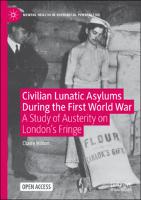Civilian Lunatic Asylums During the First World War
A Study of Austerity on London's Fringe
Abstract
This open access book explores the history of asylums and their civilian patients during the First World War, focusing on the effects of wartime austerity and deprivation on the provision of care. While a substantial body of literature on ‘shell shock’ exists, this study uncovers the mental wellbeing of civilians during the war. It provides the first comprehensive account of wartime asylums in London, challenging the commonly held view that changes in psychiatric care for civilians post-war were linked mainly to soldiers’ experiences and treatment. Drawing extensively on archival and published sources, this book examines the impact of medical, scientific, political, cultural and social change on civilian asylums. It compares four asylums in London, each distinct in terms of their priorities and the diversity of their patients. Revealing the histories of the 100,000 civilian patients who were institutionalised during the First World War, this book offers new insights into decision-making and prioritisation of healthcare in times of austerity, and the myriad factors which inform this.
Keywords
Social History; History of Medicine; History of Britain and Ireland; Psychiatry; Shell shock; Soldiers; Madness; Welfare austerity; Institutional care; Hospitals; Patient experiences; Napsbury; Colney Hatch; Claybury; Hanwell; Standards of care; Open Access; Social & cultural history; European historyDOI
10.1007/978-3-030-54871-1Publisher
Springer NaturePublisher website
https://www.springernature.com/gp/products/booksPublication date and place
2021Imprint
Palgrave MacmillanSeries
Mental Health in Historical Perspective,Classification
Social and cultural history
History of medicine
European history
Psychiatry


 Download
Download Web Shop
Web Shop